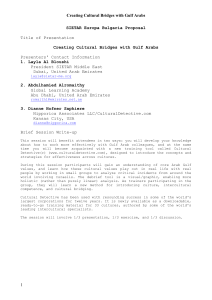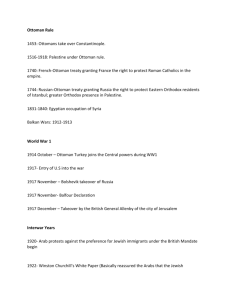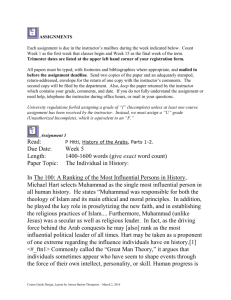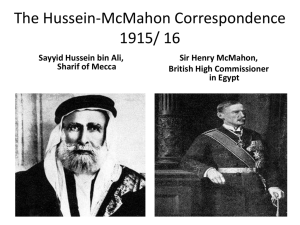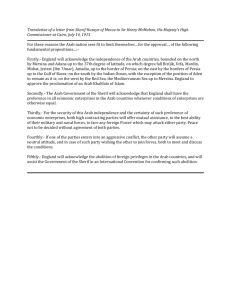House Committee on Foreign Affairs, Subcommittee on
advertisement
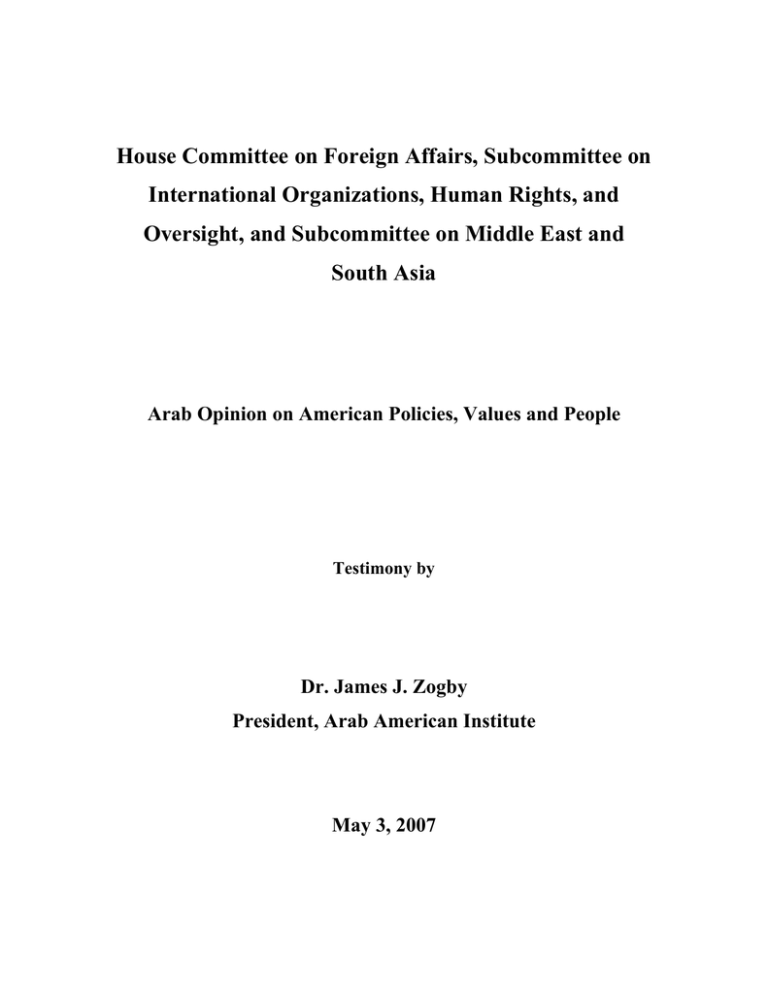
House Committee on Foreign Affairs, Subcommittee on International Organizations, Human Rights, and Oversight, and Subcommittee on Middle East and South Asia Arab Opinion on American Policies, Values and People Testimony by Dr. James J. Zogby President, Arab American Institute May 3, 2007 For the past five years we at Zogby International have had the opportunity to poll regularly and extensively in countries across the Arab world. Some of our polls that have generated the greatest attention have been those that have focused on what Arabs think about America: our people, products, values, and our policies that affect their region. Equally significant, however, have been our groundbreaking surveys of Arab values, concerns, expectations, and needs. • For the Arab Thought Foundation we undertook an extensive eight-country survey of Arab values, concerns and identity. i • In partnership with the McKinsey consulting group we conducted a thorough examination of the needs of the middle class in three Gulf Arab countries ii , as well as an elite survey of business leaders in that region, to understand their investment strategies and their attitudes toward reform issues. • With the organization of Young Arab Leaders, we looked at the particular needs of young Arabs, examining their attitudes toward women in the workplace, education, and employment opportunities. iii • For the Arab Business Council of the World Economic Forum we examined attitudes toward the application of Shari’a law, and the impact of current conflicts on regional economic and political stability. iv • v And for a number of Arab media outlets we have polled on television viewing preferences and attitudes toward reform, as well as extensive polling in Iraq, Iran, Palestine, and Lebanon during and after elections in those countries. We have also polled throughout the region for a number of U.S. clients including the Save Darfur Coalition vi , University of Maryland vii , Reader’s Digest viii , and a number of private clients, as well. What did we learn? On the one hand, we found hard data to validate what we have long assumed: that the unique history and circumstances which shaped events in different Arab countries has resulted in divergent views on some issues. But we also found that there is a substantial convergence of opinion across national and sub-regional boundaries; a series of metaissues that enable us to speak of Arab public opinion. Our polling has shown us that Arabs, like people all over the world, have as their principal political and personal concerns issues related to their families and their economic well-being, health care and the educational opportunities available to themselves and their children. In most Arab countries, these are the priorities identified by our respondents. There are, to be sure, some slight variations in the order given to these priorities in different Arab countries and their rank order can change over time in response to local events. For example, in 2005 we found that Egyptians ranked expanding employment and health care as their top priorities with improving education second. But in the same year in the U.A.E., improving education was the number one concern followed by employment and health care. (See Table 1) Or take the case of Saudi Arabia, where in 2004 the top rated issues were health care, expanding employment, and improving education in that order. But after the May 2005 terrorist attack in the Kingdom, our 2005 survey found that combating extremism and terrorism jumped to second place (from number seven in 2004) as a national priority. Table 1. Importance of Issues Facing Own Country – 2004 vs. 2005 Rankings Egypt Jordan Lebanon Morocco Saudi UAE (Ranking) Arabia 2005 2004/2005 2004/2005 2004/2005 2004/2005 2004/2005 Expanding employment 1 7/1 1/2 2/1 2/1 4/2 opportunities Improving the healthcare 1 4/3 4/2 2/3 1/3 2/2 system Improving the educational 3 2/4 9/5 4/4 3/4 2/1 system Increasing rights for 10 3/8 10/10 5/10 9/6 7/8 women Combating extremism and 5 5/10 3/6 1/6 7/2 6/4 terrorism Resolving the Israel8 1/2 2/9 7/9 4/5 1/6 Palestinian conflict Lack of political debate on 11 10/11 6/11 6/11 10/11 9/11 important issues Political or governmental 9 5/9 7/4 9/8 8/10 8/9 reform Protecting personal and 7 7/6 7/7 6/5 6/9 5/5 civil rights Advancing democracy 6 9/6 5/8 8/7 4/8 10/9 Ending Corruption and 3 5 1 2 7 7 nepotism ** ** This question was only asked in 2005 Again, in most Arab countries, it is important to note that up until the disastrous summer of 2006 (with the wars in Lebanon, Gaza, and the escalation of civil conflict in Iraq), our respondents answered what we call the “Reagan questions” in the affirmative. They indicated that they felt “better off than they were four year ago” and expected that they would be “better off in the next four years.” By December of 2006, however, this sense of satisfaction and optimism had changed dramatically, sliding downward in most countries. Table 2: Better Off/Worse Off vs. Four Lebanon 2002 2005 2006 Better 9 25 16 Worse 65 39 50 Better Worse 2002 47 20 Egypt 2005 45 18 Years Ago (December 2006) Saudi Arabia 2002 2005 2006 2002 34 49 47 28 28 12 16 25 2006 14 58 2002 41 9 Morocco 2005 41 19 Jordan 2005 37 16 2006 31 18 Table 3: Better Off/Worse Off vs. Four Years From Now (December 2006) Lebanon Saudi Arabia Jordan 2002 2005 2006 2002 2005 2006 2002 2005 Better 15 29 24 40 71 56 34 36 Worse 46 28 24 18 2 14 15 14 Better Worse 2002 48 10 Egypt 2005 29 8 2006 14 48 2002 55 2 Morocco 2005 51 5 2006 19 57 2006 27 40 2006 39 5 When asked about reforms they want to see occur in their countries, Arabs consistently point to: increased employment opportunities, improved health care and an improved educational system. Political reforms and matters of that sort are rated lower in importance. This came through quite clearly in the rather extensive poll on reform issues conducted in 2004. (See Table 1) When Arabs think about America, it is in terms of how we have impacted their region and lives—and here there is both good and bad news to report. When we first polled on Arab attitudes towards the U.S. ix we followed on the heels of a post-9/11 Gallup survey that found that Arabs and Muslims gave America extremely low approval ratings. But because that poll had been limited in focus, we thought it inadequate. And so instead of asking simply how respondents felt about America, we identified ten ways that America manifested itself in the lives of people in the Arab world. We, therefore, asked how Arabs felt about American people, values of freedom and democracy, television programs, education, science and technology, culture, products, etc. We also asked how they felt about American policy in the region. What we learned was that in almost every case, Arabs liked our values, our people, culture, and products. They did not like our policies. And it was this that drove down our overall favorable ratings and drove up our negatives. In Table 4, below, selected numbers from four Arab countries establish the striking difference between attitudes toward American science, freedom and democracy, people and movies, on the one hand, and America’s Middle East policies on the other. Table 4: Arab Attitudes Toward U.S. Values, Products, and Policies (April 2002) Aspect of America Science/Technology Freedom/Democracy People Movies/TV Policy Towards Arabs Policy Towards Palestinians Policy Towards Terrorism Saudi Arabia Fav/Unfav 71/26 52/44 43/51 54/42 8/88 5/90 30/57 Lebanon Fav/Unfav 82/16 58/40 63/33 64/35 9/86 6/89 30/65 UAE Fav/Unfav 81/14 50/44 43/42 64/32 15/76 10/83 37/48 Egypt Fav/Unfav 72/18 56/41 60/29 38/59 1/94 1/94 17/81 *Favorable includes both “very favorable” and “somewhat favorable” responses. Unfavorable includes both “very unfavorable” and “somewhat unfavorable” responses. The numbers are startling. Fifty-two percent of Saudis like our values of freedom and democracy, but only eight percent support our policy toward Arabs. Sixty-three percent of the Lebanese people like Americans, while only six percent approve of our policy toward the Palestinians. Seventy-two percent of Egyptians like American science and technology, and sixty percent like Americans; yet only one percent feel favorably about our policies toward Arabs and the Palestinians. What we also learned in this same poll was that when asked how America could help meet their country’s needs, Arabs over-whelmingly rejected our help in dealing with matters of internal reform. Even those who value our “freedom and democracy” did not want our assistance in promoting democracy in their country. Those who sought our assistance wanted two things: they wanted us to help solve the Arab-Israeli conflict; and they want assistance in capacity-building – expanding employment, and improving health care and education. We also examined how Arabs learned about us, the degree to which their views were shaped by experience or received knowledge, and whether or not this made a difference in their attitudes. We found, for example, that Arabs who know Americans, have visited America or even just report watching American television programs are more inclined to like our people, culture, products and values. But none of this makes them like our policies better or brings up our overall approval ratings. Some respondents who know Americans and have lived in the U.S. told us quite candidly that these experiences only make them want to like us more and made them feel more troubled by our behavior. Said one, “I feel jilted. I like you, but feel you don’t like us.” Make no mistake: the situation of the Palestinians, our actions and policies in Iraq, our perceived complicity in last year’s war in Lebanon, Abu Ghraib, Guantanamo Bay, secret prisons, and last year’s Dubai Ports World debacle have taken and continue to take a toll on America’s standing. By 2006, the accumulation of all these policies resulted in continued and in some cases increased overall negative ratings for the U.S. in the five Arab countries covered in our polling, with negative attitudes hardening. x Table 5: Opinion of the United States (December 2006) 2002 2005 2006 Fav* Unfav* Fav Unfav Fav Unfav Saudi Arabia 12 87 9 89 12 82 Egypt 15 76 14 85 14 83 Morocco 38 61 34 64 7 87 Jordan 34 61 33 62 5 90 Lebanon 26 70 32 60 28 68 *Favorable includes both “very favorable” and “somewhat favorable” responses. Unfavorable includes both “very unfavorable” and “somewhat unfavorable” responses. We also learned that the most significant policy issues that shaped negative attitudes were our treatment of the Palestinians, our policy in Iraq, and our overall treatment of Arabs and Islam in general – sometimes citing specific practices (detention, torture, etc.) (See Table 6.) These negative behaviors combine to call into question our adherence to our stated values. In short, it appears from our findings that Arabs are judging us not on how we live or what we say about ourselves, but on how we treat them; that is, how they perceive that we are applying our values to them. As demonstrated in Table 7, when asked whether their overall attitude toward the U.S. was shaped by our stated values or our policies, Arabs by significant majorities indicate that it is our policies that are decisive. Table 6: Arab Attitudes Towards U.S. Values, Products, and Policies (June 2004) Saudi Morocco Arabia Jordan Lebanon UAE Egypt Imp/ Imp*/ Imp/ Imp/ Imp/ Imp/ Not Not Not Not Not Not Aspect of America Imp* Imp Imp Imp Imp Imp Freedom, Democracy 32/51 49/39 31/48 75/20 23/50 39/41 Science, Technology 47/38 59/35 41/34 75/18 50/27 41/42 Iraq Policy Policy Towards Palestinians Treatment of Arabs and Muslims 88/7 89/7 79/3 81/3 68/19 71/20 82/6 89/5 68/18 72/16 94/2 95/2 69/14 82/3 61/23 90/4 73/13 87/2 • Important includes both “very important” and “somewhat important” responses. Not important includes both “somewhat unimportant” and “not important at all” responses. In Morocco on the Western edge of the Arab world, thirty-two percent say our democratic values are important to how they view the U.S. versus eighty-eight percent who say our Iraq policy is important in how they view America. In the U.A.E. on the Eastern edge of the Arab world, twenty-three percent say our democratic values and love of freedom are important in their perceptions of the U.S., but seventy-three percent say that our treatment of Muslims and Arabs is significant in how they view our country. Table 7: Importance of Values vs. Policies in Determining Attitudes Towards America (June 2004) Saudi Egypt Morocco Arabia Jordan Lebanon UAE Which is more Values/ Values/ Values/ Values/ Values/ Values/ important: Values or Policies? Policy Policy Policy Policy Policy Policy 18/79 10/86 16/76 9/89 9/75 2/81 As table 7 shows demonstrates: for three quarters to five-sixths of Arabs, our policies are more determinative of their attitude toward us than our values. This is particularly significant if we analyze data from both Table 6 and Table 7. Forty-nine percent of Saudis and seventy-five percent of Lebanese state that American freedom and democracy are important in how they view us, but only ten percent of Saudis and nine percent of Lebanese say that our values determine their view of us. In short, as I once wrote in my commentary on this study, to understand why America’s ratings in this region are so low, “It’s the Policy, Stupid.” Table 8: Impact of American Values, People, Products on Overall Opinion of the United States (December 2006) American American American American American People Products Movies, TV Education Freedom, Democracy Pos.* Neg.* Pos. Neg. Pos. Neg. Pos. Neg. Pos. Neg. Saudi Arabia 41 31 18 34 50 24 22 43 40 28 Egypt 21 41 23 28 28 31 34 35 36 21 Morocco 23 46 28 29 36 34 27 40 39 23 Jordan 27 43 31 33 30 41 23 51 47 32 Lebanon 42 32 44 18 34 25 28 37 43 19 * Positive includes both “positive” and “very positive” responses. Negative include both “negative” and “very negative” responses. Table 8 demonstrates the impact of this downward slide. As opposed to 2002 (Table 4) when attitudes toward these other manifestations of America were viewed positively, by December 2006 only “American education” received a net favorable rating in all five countries. This represents a drop in favorability ratings from fifty-two percent to twentytwo percent for American movies in Saudi Arabia; in Lebanon , the favorable for the American people dropped nineteen percent; and in Egypt the favorable rating for the American people dropped from sixty percent to only twenty-three percent. In Saudi Arabia and Lebanon, the majority view of “American freedom/democracy” and “American products” is positive. In earlier polls the “American people” were viewed positively in most Arab countries. In 2006, this is the case only in Lebanon. The impact of all of this in the broader region of the Arab world is important to note: • There is a hardening of negative attitudes toward the U.S. and now even a downwards slide in attitudes toward our people, culture, values and products. • There is less confidence that there will be peace and stability in the region in the next five years, with growing concern in several countries about the regional consequences of an Iraqi civil war; the unresolved Israeli-Palestinian conflict; and a mounting concern about Iran’s intentions and U.S.-Iranian tensions xi • There is a turning inward. Arabs are investing more in their own economies instead of in the West, and more engaged than ever before with problems closer to home. • There is a turning away from the U.S., as Arabs are factoring the East (China, India, and Southeast Asia) more significantly in their future investment strategies. xii • There is a growing public pressure on Arab governments, especially those who maintain strong ties to the U.S. to distance themselves from our policies. What can we do? Quite simply, listen to what Arab opinion is telling us, and take their concerns seriously. What they want from us is: • to play the role of peace maker in working to resolve the Arab-Israeli conflict; • a responsible end to the Iraq war that promotes national reconciliation and regional security; • support for regional capacity building that works to expand employment, improve health care, and increase educational opportunities; and • an application of our values to our relationships with the people and countries of the region that establishes us as a partner in their efforts to improve the quality of their lives and defeat the extremists who threaten our mutual security. Given the situation we are in, these challenges present us with a tall order. It will be a long road back; but I believe that it is the only course we have left before us. i What Arabs Believe: Values, Beliefs, and Concerns. The Arab Thought Foundation/Zogby 2002 Zogby, James J. “Shedding Light on the Gulf’s Middle Class.” The McKinsey Quarterly, 2007 Special Edition iii Attitudes of Arabs: An In-Depth Look at Social and Political Concerns of Arabs. Arab American Institute/Zogby International/Young Arab Leaders, 2005 iv Survey of Arabs in 6 Countries, Arab Business Council of the World Economic Forum/Zogby, 2005 v Survey of Arabs in 6 Countries: The Impact of Middle East Conflicts on Regional Economic Development. December, Arab Business Council of the World Economic Forum/Zogby, 2006 vi Six-Nation poll of Muslim Attitudes Toward Darfur, Arab American Institute/Zogby, April 2007 vii Six-Nation poll on Arab Public Opinion, University of Maryland/Zogby, 2005,2006 viii Survey of Iranian Public Opinion, Readers Digest/Zogby, 2006 ix 10-Nation “Impressions of America” Poll, Arab American Institute/Zogby, 2002 x 5-Nation Poll on Arab Public Opinion, Arab American Institute/Zogby, 2005 xi Survey of Arabs in 6 Countries: The Impact of Middle East Conflicts on Regional Economic Development. December, Arab Business Council of the World Economic Forum/Zogby, 2006 xii Ibid ii

